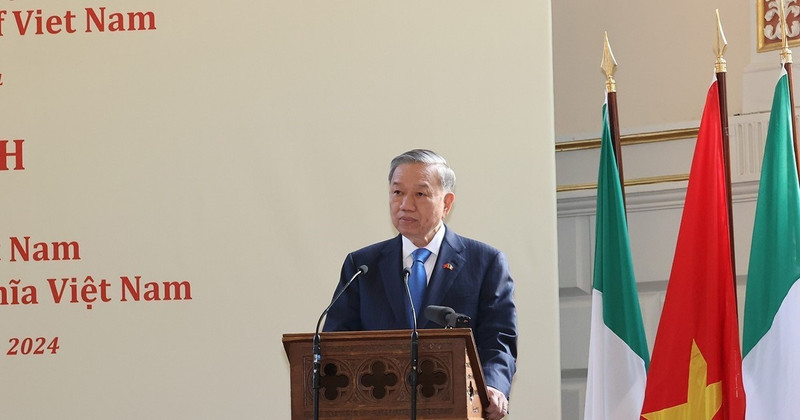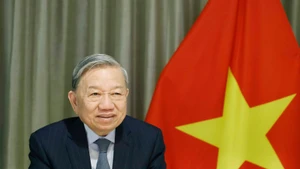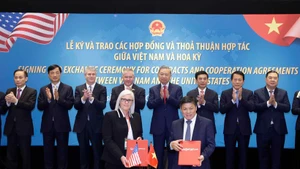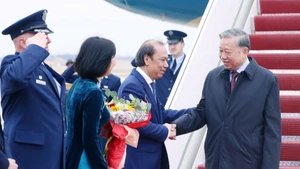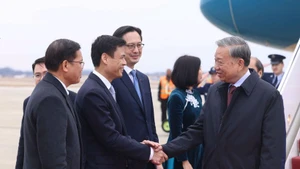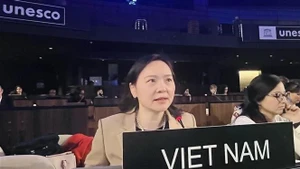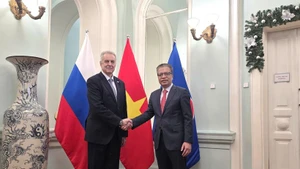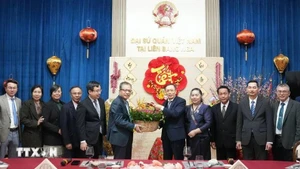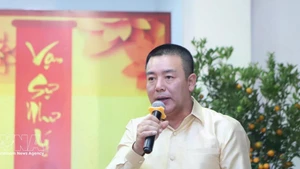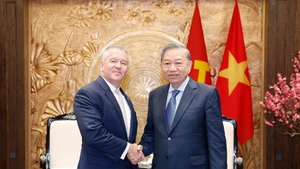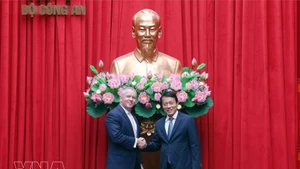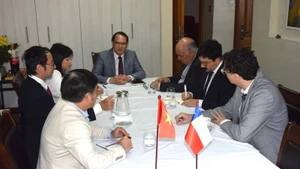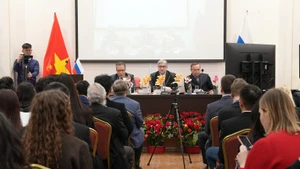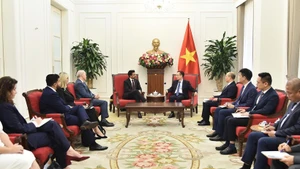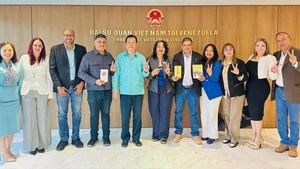He highlighted similarities on history and culture between the two countries, as well as their traditions of studiousness, hospitality, family values and solidarity. Vietnam speaks highly of Ireland's outstanding socio-economic development achievements and Ireland is a symbol of international solidarity and prestige, he said.
He expressed his gratitude to valuable support the Irish Government and people have given to Vietnam's development over the past 30 years, especially in poverty reduction, post-war consequences overcoming, assistance for vulnerable groups, enhancement of economic management capacity, promotion of gender equality and climate change response.
He affirmed under the leadership of the Communist Party of Vietnam (CPV), Vietnam pursues its consistent goal of "national independence associated with socialism", consider this a lodestar to safeguard and develop the country. Vietnam also continues to take people as the centre and driving force for development; builds a rule-of-law State, of the people, by the people and for the people; pursues the consistent implementation of a foreign policy of independence, self-reliance, peace, friendship, cooperation and development, multilateralisation, diversification of relations, being a friend, a reliable partner, and a responsible member of the international community. The policyalso covers proactive and active international integration.
In his speech, top leader Lam emphasised Vietnam’s “four no’s” defence principle of not participating in military alliances, not affiliating with one country to oppose another, not allowing foreign countries to establish military bases or use Vietnamese territory to oppose other countries, and not using force or threatening to use force in international relations. Vietnam supports and respects the United Nations Charter and international law; strongly supports the peaceful settlement of disputes and opposes unilateral actions, power politics, and the use of force or threats to use force in international relations.
With the spirit, Vietnam has made positive contributions to international peace and security. Over the past 10 years, thousands of military personnel of Vietnam have accompanied the United Nations in its peacekeeping efforts to ensure security and improve living conditions in many countries around the world. Vietnam has also actively participated in humanitarian aid in many countries across the world and supports disaster relief efforts in various countries. Entering the new era, Vietnam, with its new status and strength, is determined to effectively implement diplomacy in the new era and stays ready to make more active and proactive contributions to world politics, global economy and human civilisation.
Over the past nearly three decades of establishing diplomatic relations with Ireland, friendship and multi-faceted cooperation between the two countries have been increasingly growing. Vietnam has always valued ties with Ireland, a dynamic member of the European Union, a pioneering nation in terms of innovation. This visit will contribute to further strengthening the friendly cooperative relations between the two countries, he said.
The top Vietnamese leader laid stress on three orientations to capitalise on strategic opportunities, turn challenges into opportunity and build a prosperous future for both nations.
First, he said they should create space for new development for the two countries’ people’s interests and prosperity, expressing his belief that a strategic partnership framework in the area of higher education will be established between the two sides, contributing to promoting their strengths as well as the cooperation achievements that they have taken stock of over the past nearly 30 years and paving the ways for collaboration aligned with contemporary trends.
Furthermore, they should work to spread the shared values among the younger generation – the future leaders of both nations.
Second, it is necessary to create breakthroughs in improving self-reliance, resilience and adaptability in the face of new global challenges, change the mindset and approaches to settle these challenges, shifting from a stance of “responding and recovering passively” to that of preventing actively and controlling early and from afar”, he stated, stressing the two sides should shape up new advantages and enhance their intrinsic strength and resilience to withstand external impacts.
Third, he spotlighted the need to elevate and expand the two sides’ contributions to the international peace, cooperation and development, elaborating as active and responsible members of the international community, Vietnam and Ireland should continue bolstering multilateral collaboration and respect for international laws, particularly in settling disputes via peaceful means without threatening or using force in international relations, while upholding the role of the UN and initiating new cooperation ideas for peace, security, stability and development of the humanity.
The leader particularly underscored that Vietnam and Ireland should make more positive contributions to maintaining security, safety and freedom of navigation and overflight in the sea in accordance with the 1982 UN Convention on the Law of the Sea and international laws.
Concluding the speech, he expressed his hope that Vietnam and Ireland will continue standing shoulder to shoulder and work closely towards a higher level of ties in the future for the interests of the two sides’ people as well as for a future of peace, stability, cooperation and development in the two regions and the world.
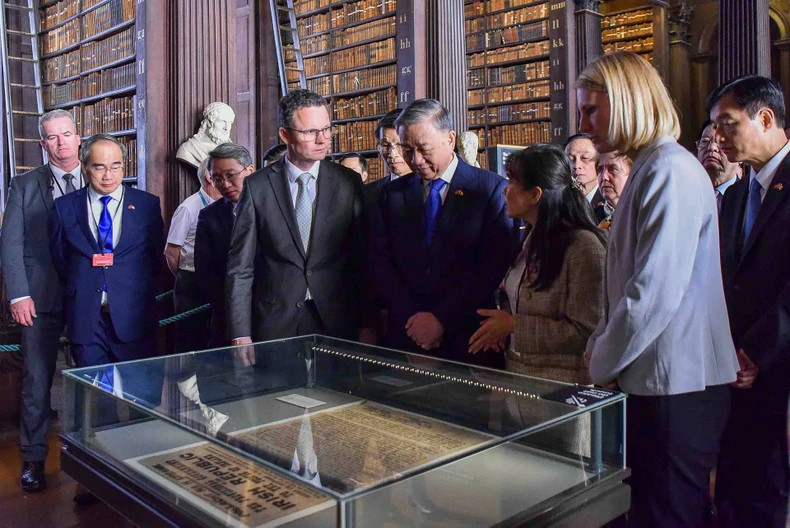 |
| General Secretary of the Communist Party of Vietnam Central Committee and State President To Lam visits the Old Library. (Photo: VNA) |
On the occasion, Party General Secretary and President To Lam visited the Old Library which houses over six million printed volumes with extensive collections of journals, manuscripts, maps and music reflecting over 400 years of academic development.
Writing in the guestbook, he highlighted that Trinity College, a symbol of culture and knowledge in Ireland, boasts valuable historical heritage, expressing his belief that with the establishment of the strategic partnership framework in higher education, Vietnam – Ireland cooperation will open up new opportunities for both lectures and students of both sides.
Trinity College Dublin, founded in 1592 by Queen Elizabeth I, is Ireland’s oldest and most prestigious university. Located in the heart of Dublin, it is considered as one of the most reputable universities in Europe.
It has been renowned for its ancient architecture with many buildings that uphold historical values like the Old Library which is home to the famous “Book of Kells”, an illuminated manuscript from the medieval period.
As a leading educational institution, the college offers a broad range of undergraduate and postgraduate courses across various areas, including art, science, engineering, medicine and law.
It has been renowned for its high quality of teaching and research, with many faculties and research institutes recognised worldwide.
Trinity College Dublin boasts a diverse student community of over 18,000 students from around the globe.
The college is planning to roll out a collaborative training programme in management and economics with the Vietnam National University, Hanoi. Over the past time, both sides have sent representatives to participate in each other's scientific workshops.
